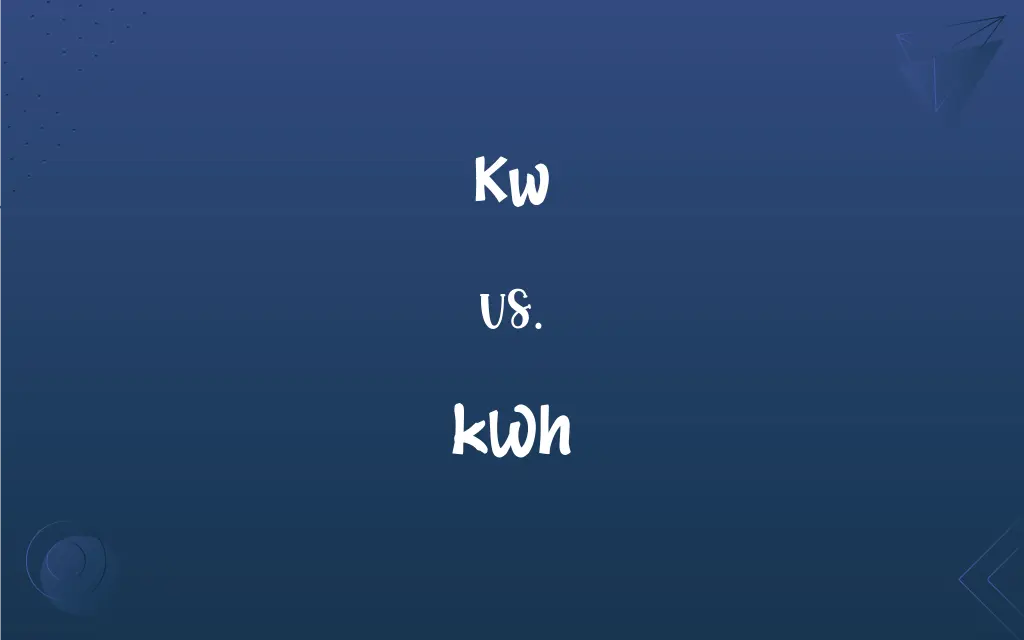kW vs. kWh: What's the Difference?
Edited by Aimie Carlson || By Harlon Moss || Updated on October 12, 2023
Kilowatt (kW) measures power, indicating consumption rate, while kilowatt-hour (kWh) measures energy, indicating total consumption over time.

Key Differences
Kilowatt (kW) and kilowatt-hour (kWh) are related but distinct terms used to describe electrical consumption and usage in distinct manners. kW indicates power, or the rate at which energy is being used at a single moment, while kWh reflects the total amount of energy used over a specified time period. Hence, kW is a snapshot of power usage at any given instance, while kWh accounts for the ongoing accumulation of that usage over time.
Understanding kW is crucial to appreciating how electrical devices draw power. One kW is equal to one thousand watts, denoting the rate of energy transfer or conversion. Conversely, kWh is a measure of energy, equivalent to using one kilowatt of power steadily over one hour. So, kW reveals how much power a device requires to operate, while kWh demonstrates the cumulative energy consumed during its operation.
If one considers kW as the speed at which a car travels, kWh would represent the total distance it covers over time. So, a device that operates at 5 kW uses energy at a rate of 5 kilowatts at any instant it's running, whereas if it operates for 3 hours, it uses 15 kWh of energy in total. kW provides a glimpse into the immediate power demand, whereas kWh extends into illustrating the sum of power used.
Applying kW and kWh, especially in electricity billing and energy management, becomes crucial. The kW rating of a device or system represents its potential instant power draw, while kWh equates to the actual energy consumed, which is what utility companies typically charge for. The distinction is crucial: kW illuminates the potential demand on a system, while kWh reveals actual usage and, therefore, true cost.
To contextualize, imagine an electric heater. If the heater has a power rating of 2 kW, it demands 2 kilowatts to function at any given second it’s active. If it operates for 5 hours, it consumes energy amounting to 10 kWh, providing a tangible measure of its overall energy consumption. The differentiation provides insight: kW dictates the instantaneous power requirement, whereas kWh symbolizes the comprehensive energy usage.
ADVERTISEMENT
Comparison Chart
Basic Definition
A unit measuring power (rate of energy usage).
A unit measuring energy (cumulative power usage over time).
Formula Relation
N/A
KW multiplied by time.
Billing Relevance
Indicates potential peak demand.
Indicates total energy usage (commonly billed for).
Context of Use
Used to describe the power rating of a device.
Used to calculate total energy consumption.
Physical Analogy
Similar to speed (rate of motion).
Similar to distance (cumulative motion over time).
ADVERTISEMENT
kW and kWh Definitions
Kw
KW provides a snapshot of a device's power requirement at any moment.
An electric car might utilize up to 50 kW during peak acceleration.
kWh
KWh is utilized by utility companies to bill consumers for their total energy usage.
My monthly electricity bill indicates that my household used 800 kWh last month.
Kw
KW stands for kilowatt, equating to one thousand watts.
An oven using 3 kW is consuming 3,000 watts during its operation.
kWh
KWh provides a comprehensive measure of electrical consumption, combining power and duration.
If a 100 kW motor runs for 0.1 hours, it will consume 10 kWh of energy.
Kw
KW is a unit of power describing the rate of energy usage.
A heater might require 1.5 kW to operate, demonstrating its power demand.
kWh
KWh allows for evaluating and comparing the energy efficiency of different appliances.
Comparing the kWh usage of various washing machines helps determine the most energy-efficient model.
Kw
KW illustrates the instant energy consumption of an electrical device.
When active, an air conditioner might demand 2 kW of power to function.
kWh
KWh accumulates energy usage over time, regardless of fluctuations in power (kW) during that period.
Even with varied power demands throughout its operation, your dishwasher might use 2 kWh per cycle.
Kw
KW is used to describe the power output or input of electrical systems.
A small-scale wind turbine may deliver up to 5 kW under optimal conditions.
kWh
KWh, kilowatt-hour, quantifies energy by representing one kilowatt of power used for one hour.
Your air conditioner consumed 15 kWh after running consistently for three hours at 5 kW.
Kw
A unit of power equal to 1000 watts
FAQs
Is kW a measure of energy?
No, kW is a measure of power, indicating the rate of energy usage.
What does kW stand for?
Kilowatt, a unit measuring power, equivalent to one thousand watts.
Are we billed for kW or kWh by electric companies?
Electric companies typically bill consumers based on energy usage measured in kWh.
What impacts an appliance’s kW?
Factors like size, type, and model affect an appliance’s power rating (kW).
What influences a higher kWh on my bill?
Both higher kW appliances and longer usage durations contribute to increased kWh on electric bills.
Is kWh applicable to non-electrical energy?
While commonly used for electricity, kWh can theoretically quantify any energy type.
How is kWh calculated?
kWh is calculated by multiplying power (in kW) by the time (in hours) it’s used.
Is a higher kW always more expensive?
Not necessarily. While higher kW indicates a higher rate of energy use, total cost depends on duration of use (kWh).
Is kWh the same globally?
Yes, kWh is a standardized unit of energy used worldwide.
How can I estimate an electric car’s kWh usage?
Multiply the car’s power usage in kW by the duration of use in hours.
Why is kWh used for electricity billing?
kWh represents total energy consumed, providing a fair billing metric, unlike kW which only shows power rate.
Can I reduce my kWh usage without altering my appliances’ kW?
Yes, using appliances for shorter durations will reduce total kWh usage.
Why might two identical appliances have different kWh?
Different usage durations or variable power levels during operation can result in different kWh despite identical kW.
What does kWh stand for?
Kilowatt-hour, a unit measuring energy, equivalent to using one kilowatt of power for one hour.
How does a utility meter record kWh?
Utility meters log the cumulative energy (kWh) consumed over time, regardless of varying kW levels.
Can I convert kW to kWh?
You can calculate kWh from kW by multiplying it by the number of hours of use.
Why is kW important for device specifications?
kW indicates a device’s power demand, affecting compatibility with electrical systems and other devices.
Can an appliance have a different kW and kWh?
Yes, kW remains constant, but kWh can vary depending on how long the appliance is used.
Does kW affect electrical infrastructure?
Yes, systems must accommodate the kW demands of all connected appliances to avoid overloads.
How do I calculate my appliance’s kWh usage?
Multiply the power rating (kW) by the total hours of operation to get kWh.
About Author
Written by
Harlon MossHarlon is a seasoned quality moderator and accomplished content writer for Difference Wiki. An alumnus of the prestigious University of California, he earned his degree in Computer Science. Leveraging his academic background, Harlon brings a meticulous and informed perspective to his work, ensuring content accuracy and excellence.
Edited by
Aimie CarlsonAimie Carlson, holding a master's degree in English literature, is a fervent English language enthusiast. She lends her writing talents to Difference Wiki, a prominent website that specializes in comparisons, offering readers insightful analyses that both captivate and inform.































































